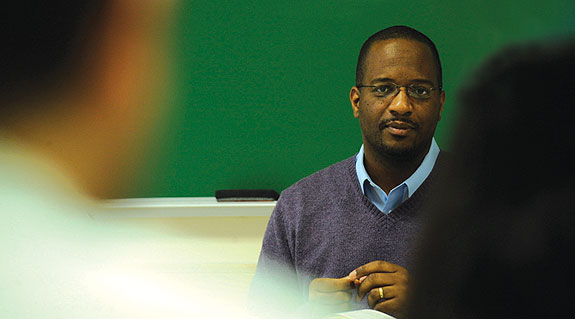He Speaks in Your Voice: American.
By Tricia Brick
Gene Andrew Jarrett began his 2006 book Deans and Truants with a deceptively simple question: What is African American literature? The term, after all, refers not merely to the subject matter of the works it describes but to literature that both represents the African American experience and is written by authors who are themselves black. But what, then, of black authors who have written works without black characters? Or of those who are of mixed race? “You can’t take this question for granted, because it’s at the heart of so many questions of human identity and, in particular, race,” says Jarrett, an associate professor of English.
The editor of such books as African American Literature Beyond Race: An Alternative Reader and The New Negro: Readings on Race, Representation, and African American Culture, 1892–1938 (with Harvard’s Henry Louis Gates, Jr.), Jarrett has spent his career studying racial representation in American literature—in particular, how African Americans have been understood both as characters in and as authors of literary works over the last two centuries. His Deans and Truants looks at black authors throughout American history who have used literature to challenge beliefs about race that were accepted as truths in their day.
And in his forthcoming book Representing the Race: The Politics of African American Literature from Jefferson to Obama, Jarrett examines the political implications of African American literature—from the role that Phillis Wheatley’s poetry played in Thomas Jefferson’s disparagement of African American political unity to the role that Barack Obama’s Dreams from My Father has had in shaping the bipartisan, pragmatic political culture of his presidency.
Like other authors who have spoken on behalf of historically disenfranchised groups, African American writers have long understood that the way a group is represented in literature can influence or transform how the members of that group are perceived—and, by extension, how they are treated—in life outside of books. Following the Civil War, for example, a new literary type began to appear in works by African American authors. Known as the “New Negro”—in contrast to the “Old Negro,” the submissive, unrefined, dialect-speaking plantation slave—this figure was well dressed and well educated, a speaker of formal English who was culturally sophisticated and politically active; a character, in other words, who might inspire fondness and admiration in readers, rather than an object of pity or scorn.

Associate Professor of English Gene Jarrett
The poet, novelist, and essayist Paul Laurence Dunbar could have been a model for the New Negro type. Born to former slaves in 1872, Dunbar became one of the most celebrated black authors of his generation for a series of poems that were pastoral panegyrics to the Old Negro, written in dialect and much lauded for capturing an “authentic black voice,” says Jarrett.
But the dialect poems that earned Dunbar a reputation during his lifetime as the “poet laureate of the Negro race”—a well-intentioned designation, albeit one based on a tacit assumption of difference in kind and ability between races—represented only a small part of his oeuvre. He was also the author of many poems in the American Romantic and Victorian styles, works in formal English on topics of nature, love, and other subjects popular at that time. Additionally, he wrote four novels and more than 100 short stories, only some of which focused on the African American experience.
Jarrett, who has edited several collections of Dunbar’s writings, is now at work on his biography.
“Paul Laurence Dunbar was a man of contradictions,” says Jarrett. “Whereas other writers of his time were working with New Negro images, he was, in his poetry, working with images of the Old Negro in order to make money and to achieve fame. And yet in some ways he was ahead of his time. He wanted to be considered not as a black writer but just as a writer; yet in that time after slavery, perhaps society was not ready for someone like him. Because of the expectations people had, he couldn’t be just a writer, he had to be the ‘poet laureate of the Negro race.’ That was the burden he had to bear.”
Today, in the wake of Obama’s election to the presidency, Jarrett asks whether society might finally be catching up with Dunbar. “Some people say that we are living in a post-racial world,” Jarrett says. “Whether or not that’s true, perhaps today people are willing to entertain the notion that a person of African descent could be a writer rather than an African American writer. If I were writing Deans and Truants today, I might begin differently. Perhaps a new question could be: Why do we still have African American literature as a category? Maybe we should just say ‘American literature.’”
“He wanted to be considered not as a black writer but just as a writer; but in that time after slavery, perhaps society was not ready for someone like him. Because of the expectations people had, he couldn’t be just a writer, he had to be the ‘poet laureate of the Negro race.’ That was the burden he had to bear.”
Read Professor Gene Jarrett’s essay on Paul Laurence Dunbar, “‘Entirely Black Verse from Him Would Succeed’: Minstrel Realism and William Dean Howells.” This article was originally published in Nineteenth-Century Literature, Vol. 59, pp.494-525. The author thanks Nineteenth-Century Literature and the University of California Press for the right to reprint the essay here.




